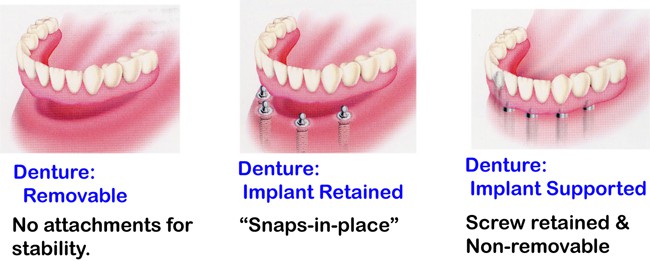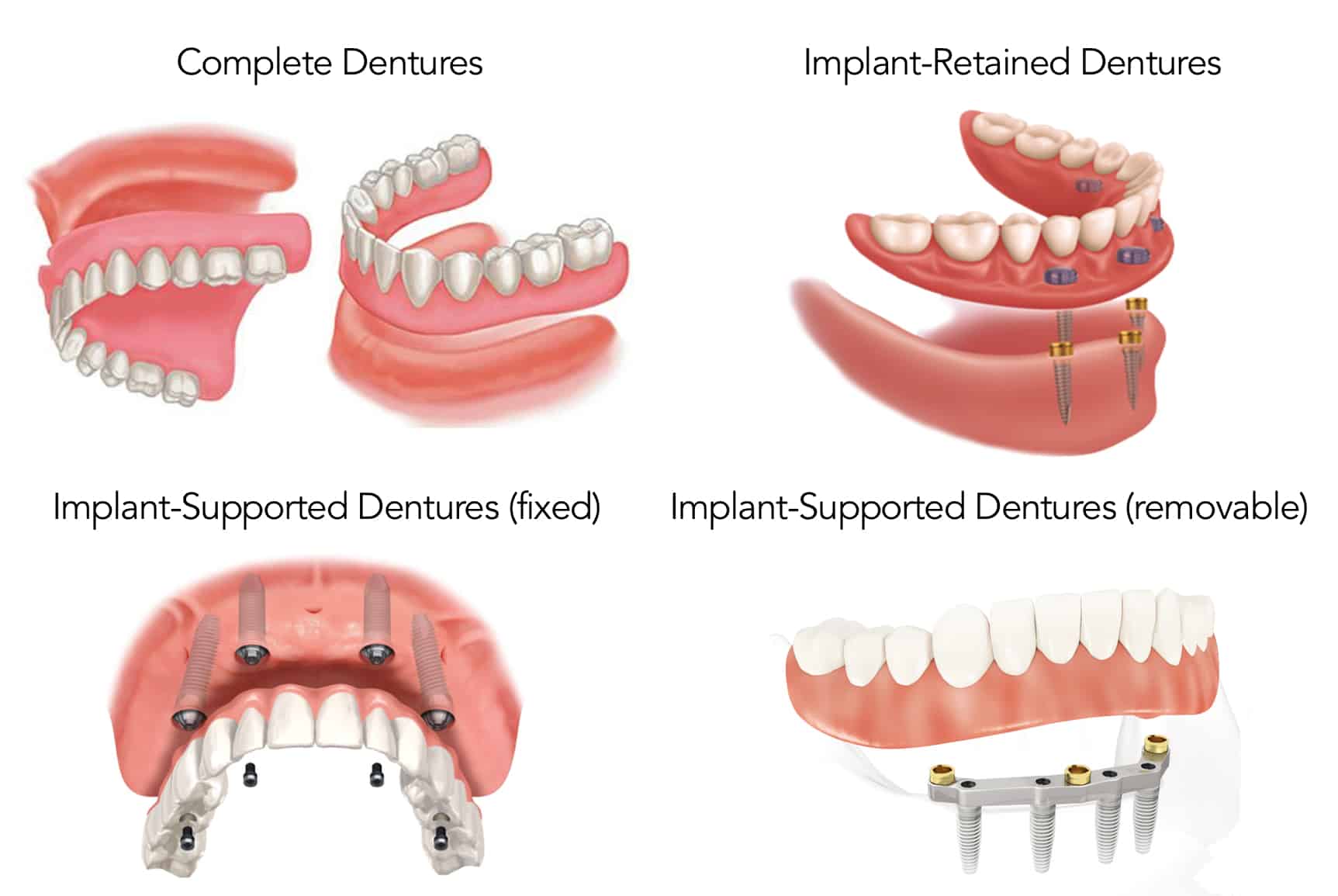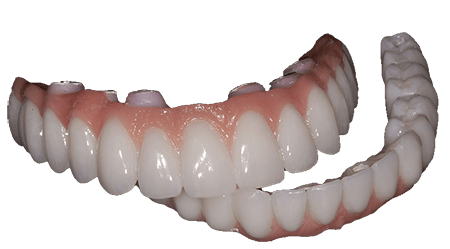
Snap on dentures and All on 4 dental implants are both great options to replace a full set of teeth. All on 4 is also called full mouth permanent implants. In this article we discuss the pros and cons of both of these options including differences in the teeth and the procedure costs.
Implant dentures are also called snap on dentures. It is basically a traditional denture with additional snaps that connect the teeth to the implants. The snappy attachments are made by a company called Zest Anchors. The snap-in system has a male part connected to the the implants and a female part that is inserted into the under-side of the implant teeth. Snap-on teeth need to be taken in and out of the mouth for cleaning and maintenance. If the denture is made properly, it will not dislodge or rock during eating hard foods or talking. Implant dentures do not require any adhesive such as Fixodent.
The biggest difference between All on 4 full mouth implants and snap-on teeth is that snap on teeth are removable and All on 4 stay permanently in the mouth. Secondly, all on 4 teeth are usually made of zirconia which is much more durable and feel thinner, smoother and more natural feeling material.

denture prices options
What is Snap On Dentures Video?
Permanent All on 4 Implant Teeth
Permanent implants is a much different full mouth implant option. The biggest difference is snap-on dentures are removable and need to be taken out for proper maintenance and hygiene. All on 4 teeth are permanently installed into the mouth and are completely supported by implants. All on four is not removable and never comes out of the mouth during eating, teeth cleaning or ever unless the dentist uninstalls them.
The other very obvious difference is snap on teeth are made of acrylic and all on 4 is made out of zirconia. Zirconia is basically a high grade porcelain. Zirconia is a lot like ceramic and is very smooth, strong, thin and does not stain or break. Zirconia implant teeth last a lot longer than acrylic because they do not wear, break or absorb plaques and smells.
A much cheaper version of all on 4 teeth are made out of acrylic. Acrylic is basically a high grade plastic. Clear Choice for example offers acrylic as the standard teeth and the zirconia teeth are an upgrade for a higher price. Acrylic teeth are also called “hyrbid dentures.”
What is All on 4 Full Mouth Implants Video
Dr. Adams operates the dental implant implant center at Maryland Holistic Dentist in Spencerville, MD. He has successfully finished over 500 sets of implant teeth. Dr. Adams is dual licensed as a dentist and in IV dental anesthesia.
Contact Dr. Adams for a complimentary consultation or 2nd opinion

dr gary adams
Snap On vs Traditional Dentures:
There are 2 clear advantages of snap-in teeth vs traditional dentures. First, the snap in system helps the teeth stay in the mouth and remain stable even while eating hard foods and talking. Secondly, snap-in dentures do not cover the palate with plastic. The biggest problem with standard dentures (other than they are unstable) is it changes speech and alters taste by covering up the palate.

implant denture vs all on 4 14
All on 4 implants need more implants than Snap-in
Implant supported dentures need only two to four implants for support as the denture flanges provide additional support. On the other hand, all on 4 bridges need at least 4-6 dental implants when a complete arch of teeth is being replaced. To summarize 10-12 implants are needed for all on 4, but only 6-8 for snap-on teeth.
What is all-on-4 dental implants?
The all-on-4 concept for replacing missing natural teeth is basically a technique to replace all missing teeth in an arch with only 4 dental implants. All on 4 can support approximately 12-14 teeth. Temporary teeth are provided on the same day of surgery so the patient is not toothless. The All-on-4 concept is most frequently used for people who prefer teeth that stay in the mouth permanently.
All on 4 Treatment Process
The whole procedure involves two main stages. The surgical phase involves radiographic assessment with the help of x-rays and a cone beam CT scan. Thorough assessment of bone quality and volume is important. These 4 dental implants are placed in each arch by skilled dental professionals under profound local anesthesia for minimizing pain and discomfort. The patient can also choose to be put to sleep for the procedure.
On the day of surgery, all the remaining teeth are removed. Then the sites are cleaned and bone grafting is performed. Implants are put into the jaw. Special care must be taken for accurate positioning, alignment, parallelism, angulations and inclination of dental implants for achieving best outcomes. Temporary teeth are delivered immediately after the surgery and always on the same day. You will be called after a week for routine checkup and assessment.

All on 4 complete dental implants
Acrylic or Zirconia All on 4 Teeth Materials?
The zirconia teeth are more expensive but they may last a lifetime and feel and function better. The acrylic teeth need to be replaced every 3-10 years depending. With the following in mind a decision must be made about the final teeth material:
- Appearance,
- Durability,
- Longevity,
- Fit and function of framework,
Acrylic teeth used to be the Gold Standard before Zirconia
- Can get discolored,
- Color match is not exact,
- Does not withstand chewing and biting forces,
- Can fracture easily,
- Can transfer stresses to implant causing implant fracture.
Solid printed zirconia teeth are stronger and more cosmetic
- Much stronger and durable,
- Best color match,
- Lifelike and natural looking,
- Do not get stained and discolored due to non-porous nature,
- Resistant against plaque formation and bacterial accumulation,
- Does not gets chipped off or cracked like acrylic,
- Permanent solution,
- Fabricated with CAD/CAM technology.
All on 4 vs Snap On Denture Cost
An entire mouth of All on 4 usually costs around 50K all-in. Snap on teeth cost roughly 30K for an entire set of teeth. The prices include sedation, removing all remaining teeth, bone grafting and temporary teeth. Removable teeth are always cheaper compared to permanent teeth. Zirconia all on four teeth and implants are expensive and their cost becomes almost double when compared with Snap-on teeth. Implant dentures requires half as may implants and the acrylic teeth are a fraction of the price of zirconia. In the long run, all on 4 are more cost effective because the teeth last a lot longer and the maintenance costs are much less over time.
Should Teeth be Removed and Replaced with Implants?
One thing to consider is whether or not you should replace all your teeth with implants or save your teeth? Sometimes replacing teeth can save considerable future dental spending in root canals, fillings and crowns. Implants do not rot ever need fillings or root canals. In fact, they can last a lifetime. Consider this carefully and look at reviews about all on 4 dental implant teeth. There are many different ways to replace teeth with implants. Consider all the different ways to replace teeth with implants. And if it is right for you, then you should go for it.
Is All on 4 or Snap-on teeth a better investment?
Removable dentures are most commonly provided to those patients who have lost multiple or all teeth and cannot afford dental implants. These dentures can be easily removed and cleaned at home. You will need to place these dentures in a bowl containing clean water outside the mouth during sleep. Conventional removable partial and complete dentures are considered to be optimum replacement restorations for your missing or lost natural teeth. These dentures are,
- Relatively economical and cheap,
- Serve well for a limited period of time,
- Can restore chewing and eating on interim basis.
However conventional removable dentures have many limitations which make them unsuitable for permanent restoration of structure and function of lost natural teeth.
How to Take care of Snap on Dentures
- Removed regularly at night before going to sleep,
- Placed in a water jar otherwise permanent size changes can occur,
- Removed before sleeping in order to avoid the disaster of accidental swallowing,
- Conventional dentures are prone to cause continuous bone loss resulting in change of facial dimensions, loosening of dentures with time and compromised appearance.
- Mobility can occur in lower dentures,
- Dentures may come out of mouth during speaking and laughing if become loose with time,
- Can cause irritation and discomfort in soft tissues and gums.
Fixed prosthetics aims at providing dental bridges or dental implants which do not need to be removed at night. Fixed restorations provide a feeling of completeness and people regain their lost confidence. However, when dental bridges are the fixed option.
What about Natural Teeth Bridges
- These require removal of sound tooth structure from adjacent teeth for support,
- There may be need to perform root canals of teeth acting as support,
- Expensive as compared to removable dentures.
Dental Implants
Dental implants do not need removal of healthy tooth structure or the involvement of adjacent teeth. Dental implants act as replacement of natural tooth’s roots and make a strong connection with socket bone. When we compare all above options, these have their own benefits and drawbacks. When old age, bone loss and economical conditions are considered, you may opt for removable prosthetics. However, affordability, young age, healthy bone and better oral hygiene maintenance will always vote in favor of fixed restorative options in the form of dental implants or dental bridges.
Removable Dentures are Supported by Gum Tissue
Conventional complete dentures are the tissue supported dentures which are fabricated when people lose all teeth and need replacement for restoration of structure and function. Keeping in view various limitations and drawbacks of conventional removable dentures, advanced dentistry offers dental implants incorporated within the design of dentures for increased retention, support and stability purpose. These are known as implant supported dentures or locator dentures or implant over-dentures.
An implant retained or implant supported denture is basically a partial or complete denture attached or connected to an Osseo-integrated dental implant. Also called implant denture or dentures with implants. This dental implant is placed within the socket bone and gums similarly as the root of a natural tooth does. Implant supported dentures,
- Provides a stable, fixed and retentive foundation to the denture attached over it containing artificial teeth,
- Ensured stability when you speak, eat, chew, laugh, drink and yawn,
- Enhances your self-esteem and confidence in daily life activities,
- Providing comfort and ease,
- Gives you a life-like feeling.
Limitations of Implant supported dentures
Dental implants are considered to be the best fixed prosthesis for all age groups. However, certain factors which may dictate the feasibility of placing this prosthesis in your mouth should be kept in mind.
- Patients should not be suffering from any systemic illness such as uncontrolled diabetes, hypertension or immunosuppressive disorder,
- Another major requirement for dental implants placement is the amount, width and height of healthy alveolar bone. If you have sufficient alveolar bone, you are a good candidate for implant supported dentures,
- When replacement of missing teeth in upper arch is considered, your implant dentist will also evaluate position and distance of sinus before placing dental implant in this area.
However, modern dental procedures have developed for bone grafting in areas with compromised socket bone. You can benefit from latest artificial bone grafting methods before placement of dental implants in your mouth.

 (301) 421 1996
(301) 421 1996 burtonsvillesmiles@gmail.com
burtonsvillesmiles@gmail.com